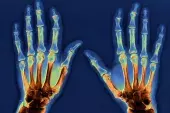Joint injections for hand osteoarthritis no more effective than placebo, finds study
By Melanie Hinze
Intra-articular therapies for hand osteoarthritis (OA) are no better than placebo, while the effectiveness of topical NSAIDs remains uncertain, new research published in RMD Open suggests.
The Danish researchers conducted a systematic literature review with pairwise and network meta-analyses. They found 72 trials, involving a total of 7609 participants and 29 pharmacological interventions for hand OA. Sixty of these trials, including 5246 participants, looked specifically at pain and were included in a pooled data analysis.
The researchers found that intra-articular hyaluronate, intra-articular glucocorticoids and hydroxychloroquine were no better than placebo, with effect sizes of 0.22, 0.25 and −0.01, respectively.
They noted that although the lack of efficacy of intra-articular glucocorticoids had been found in previous studies, this conflicted with guidelines which conditionally recommended that these could be considered in people with painful hand OA.
Similarly, topical NSAIDs were comparable to placebo in the pairwise meta-analysis on pain, function, health-related quality of life and grip strength. However, they were superior to placebo in pairwise meta-analyses that excluded high risk of bias trials on pain and the pairwise meta-analysis on patient global assessment. The researchers said this inconsistency emphasised the need for more high-quality, placebo-controlled trials to support current guidelines.
Oral glucocorticoids were consistently effective for pain, function, patient global assessment and health-related quality of life.
The researchers also found that although oral NSAIDs appeared less effective than oral glucocorticoids, they did demonstrate consistent effectiveness in the pairwise meta-analyses on pain, function, patient global assessment and grip strength.
Professor David Hunter, Florance and Cope Chair of Rheumatology and Co-Director of Sydney Musculoskeletal Health Flagship, The University of Sydney, said that the findings from this network meta-analysis were broadly consistent with the recommendations of the most recent guidelines (including those from the European Alliance of Associations for Rheumatology and American College of Rheumatology).
‘In general, NSAIDs are first line,’ he said. ‘Most clinicians, particularly when faced with a patient population that often has an increased risk of toxicity from oral NSAIDs, will give topical NSAIDs as a trial.’
Professor Hunter said that most osteoarthritis clinicians did not really know what to do with the findings of a recent oral corticosteroid trial (Lancet 2019; 394: 1993-2001) that found short-term efficacy for 10 mg prednisolone.
‘It is very likely that long-term harms from steroids for this chronic disease will outweigh the benefits,’ he said.
‘It is very important to recognise that pharmacological approaches are an adjunct or addition to core treatments focused on exercise, education and, where appropriate, the use of supports,’ Professor Hunter added.


